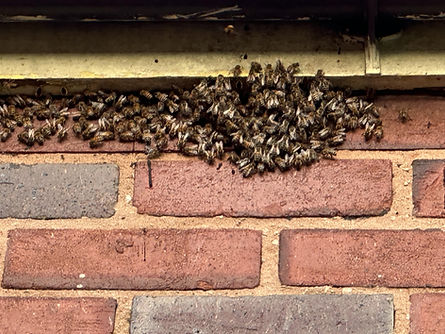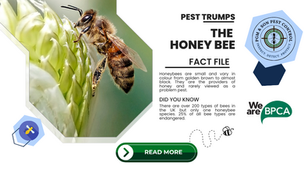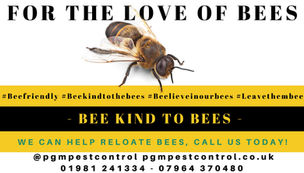Bee Nest Control, Removal and Advice
in Herefordshire & Worcestershire
PGM promote best practice throughout Herefordshire and Worcestershire and being a member of the British Pest Control Association provides independent proof that we’re committed to excellence in every part of our business. FAQs ↗

Having a Problem With Bees?
PGM & Son Pest Control will not treat bees unless there is a serious risk to public health. Bees are great for the environment and, as they are beneficial, we do not consider them to be a pest. Bees will not normally sting unless provoked so PGM encourage you to try to live in harmony with your bees.
If, however, your bees are causing a nuisance we can suggest that you contact your local beekeeper who may be able to remove the swarm.
Visit: www.bbka.org.uk/swarm And enter your postcode at the foot of the page to find your local beekeeper. Alternatively, you can contact the British Beekeepers Association on 0871 362 0138 (please note calls to this number cost 24p for the first minute and 9p per minute thereafter plus your phone company's access charge). They should be able to point you in the direction of the nearest beekeeper.
If there is a risk to public health please contact us by email or use our emergency call-out line.

Information on Bee Hive Removal throughout Herefordshire and Worcestershire.
At PGM & Son, WE LOVE BEES! We do everything we can to remove honey bees without harming them, this goes for Bumble bees too.
All bees are beneficial and at PGM & Son we do not consider them to be a pest. Bees are endangered so unless there’s a serious threat to human life, pest controllers will not use pest control treatments. If your pest controller recommends using a pesticide on your bee problem, THINK AGAIN!
Here’s some useful information about our much loved insect:
The Honey Bee (Apis Mellifera)
They live in the wild or are kept by beekeepers. Either way, they will not sting unless provoked. Because of their importance to the ecosystem we strongly recommend that every effort should be made to avoid controlled treatment or removal of a bees’ nest. Use of a pesticide should only ever be considered as a last resort.
There are several species of bees native to the UK. All bees are pollinators and, if left undisturbed, will cause no harm. They’re very helpful to gardens and crops and that’s why we love them at PGM & Son. Our beautiful counties of Herefordshire and Worcestershire is in no small way owed to our friend the bee!
Risks of treating Bees with pesticides
If foraging bees locate a nest which has been treated with a pesticide they may come into contact with the pesticide and carry it away. This could result in contamination of honey supplies (including in other nests).
Got a problem with bees? Want to get rid of a bees nest? Seeking pest control or removal for bees’ nests? Call our friendly team and we will give advice on what action you should take and whether removal or treatment is necessary.

Our team discovered a colony of honey bees nestled on a gate in Worcestershire. While many see bees as pests, these hardworking pollinators are vital to our ecosystem.
We carefully relocated them to ensure they continue to thrive and support our environment.
Let's protect our bees and appreciate the essential role they play in nature.

Our pest control team discovered a thriving colony of honeybees nestled on a tree in Herefordshire
Swarming is a natural part of the bee life cycle, where a queen and her workers leave the hive to start a new colony. While it may look alarming, swarms are usually non-aggressive and just looking for a new home.
Our team is trained to handle these situations safely and responsibly, working with local beekeepers to relocate and protect these vital pollinators.
Remember: not all “pests” are pests!
If you spot a swarm or suspect bees nearby, call the professionals—we’re here to help, not harm.
Helpful Articles About Bees
We love sharing our knowledge with our customers!
Whether you're fascinated by their teamwork, curious about their hidden world, or just want to learn something new about bees, we've got you covered. Learn more in our articles about bees to discover just how incredible these tiny insects really are!










